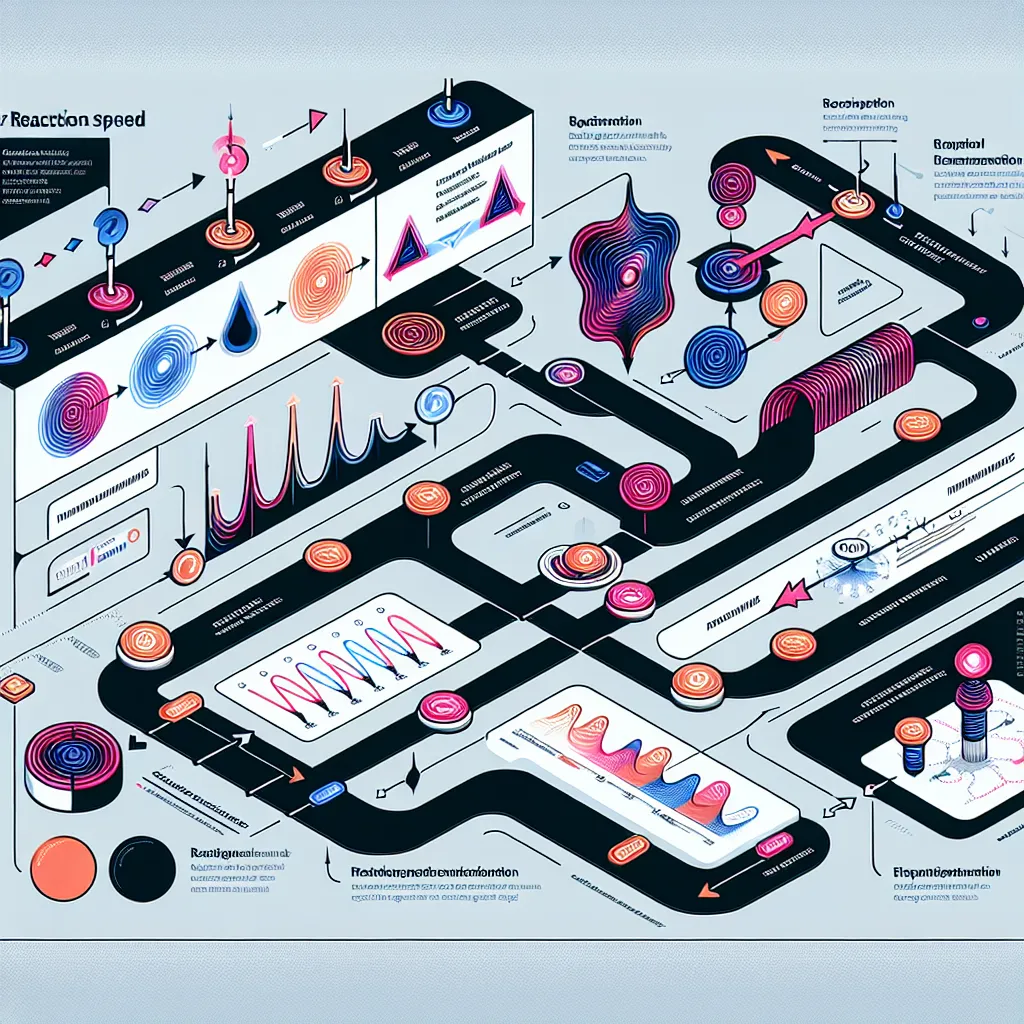Reaction speed is a crucial concept in sports and cognitive psychology that often appears in IELTS exams. Let’s explore this term in depth to enhance your vocabulary and exam performance.
Understanding ‘Reaction Speed’
Definition: Reaction speed, also known as reaction time, is the interval between the presentation of a stimulus and the initiation of a response.
Part of Speech: Noun phrase
Pronunciation: /riˈækʃən spiːd/
In the context of sports and athletics, reaction speed refers to how quickly an athlete can respond to a stimulus, such as the starting gun in a race or a sudden move by an opponent.

Usage in Context
Examples and Analysis
-
The sprinter’s exceptional reaction speed gave her an advantage at the starting block.
In this sentence, “reaction speed” refers to the athlete’s ability to quickly respond to the starting gun, highlighting its importance in competitive sports. -
Researchers are studying how video games might improve reaction speed in elderly individuals.
Here, “reaction speed” is used in a cognitive context, suggesting its relevance beyond sports and its potential for improvement through specific activities. -
The goalkeeper’s remarkable reaction speed allowed him to deflect the unexpected shot.
This example demonstrates how reaction speed is crucial in team sports, particularly for positions that require quick responses to unpredictable situations. -
In IELTS speaking tests, good reaction speed can help candidates respond promptly to unexpected questions.
This usage relates reaction speed to language learning and test-taking, showing its relevance to IELTS preparation. -
The new traffic light system was designed to test drivers’ reaction speed in various conditions.
This example extends the concept to everyday situations, illustrating its importance in road safety.
Common Contexts
Reaction speed is frequently discussed in:
- Sports psychology and performance analysis
- Cognitive science and neurology
- Human-computer interaction studies
- Traffic safety research
- Educational psychology, including test-taking strategies
Frequency in IELTS
“Reaction speed” and related concepts appear moderately often in IELTS exams, particularly in:
- Reading passages about sports science or cognitive psychology
- Listening sections discussing athletic performance or scientific experiments
- Speaking tasks related to sports, technology, or human abilities
- Writing Task 2 essays on topics such as the impact of technology on human skills
Vocabulary Analysis
Word Structure
- Reaction: Re- (prefix meaning “again” or “back”) + Action (noun)
- Speed: Single root word
Synonyms and Antonyms
Synonyms:
-
Response time (/rɪˈspɒns taɪm/) – noun phrase
This term is often used interchangeably with reaction speed, especially in scientific contexts. -
Reflex speed (/ˈriːfleks spiːd/) – noun phrase
While similar, this term often implies a more automatic, less conscious response. -
Quickness (/ˈkwɪknəs/) – noun
A more general term that can include reaction speed as well as other aspects of rapid movement.
Antonyms:
-
Sluggishness (/ˈslʌɡɪʃnəs/) – noun
This term implies slow reactions and a lack of speed in responses. -
Delayed response (/dɪˈleɪd rɪˈspɒns/) – noun phrase
This phrase directly contrasts with quick reaction speed, indicating a slower-than-normal response time.
Memorization Techniques
Mind Mapping
Create a mind map with “Reaction Speed” at the center, branching out to related concepts such as:
- Sports applications (sprinting, boxing, goalkeeping)
- Cognitive aspects (attention, processing speed)
- Factors affecting it (age, practice, fatigue)
- Measurement methods (simple vs. choice reaction time tests)
Visualisation Technique
Imagine a sprinter at the starting block. As the starting gun fires (stimulus), visualize a lightning bolt traveling from the runner’s ears to their brain, then to their muscles (reaction process), resulting in an explosive start (response). This vivid imagery can help cement the concept in your memory.
Practice Exercises
Application in IELTS
-
Writing Task 2:
Write a paragraph discussing how technology might affect human reaction speeds in the future. Use “reaction speed” and at least two synonyms in your response. -
Speaking Practice:
Describe a situation where you needed quick reaction speed. How did you perform? What factors influenced your reaction speed? -
Reading Comprehension:
Read a short passage about reaction speed in sports and answer questions about main ideas, details, and vocabulary usage. -
Listening Exercise:
Listen to a lecture on factors affecting reaction speed and complete a gap-fill exercise using key terms from the lesson.
Repetition and Review
Create flashcards with “reaction speed” and related terms on one side and definitions or example sentences on the other. Review these cards regularly, increasing the intervals between reviews as you become more familiar with the terms.
Conclusion
Understanding and effectively using terms like “reaction speed” can significantly enhance your IELTS performance. This vocabulary not only enriches your language skills but also demonstrates a grasp of scientific and sports-related concepts, which are common themes in the exam.
Remember to practice using this term in various contexts, and don’t hesitate to incorporate it into your IELTS preparation. As you continue to expand your vocabulary, you’ll find your ability to express complex ideas improving, leading to better scores across all sections of the IELTS test.
We encourage you to share your experiences with learning and using “reaction speed” in the comments below. How has this term helped in your IELTS preparation? Do you have any questions about its usage or related vocabulary? Let’s discuss and learn together!
For more insights on improving your IELTS performance, check out our articles on speed training and biomechanics in sports, which offer valuable vocabulary and concepts related to physical performance and scientific analysis in sports.